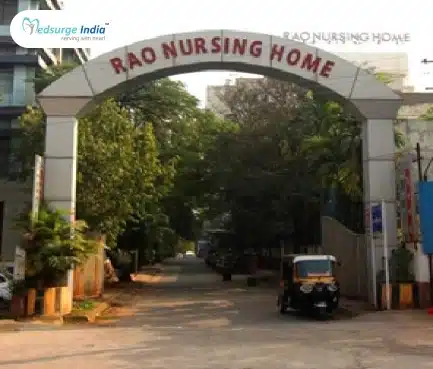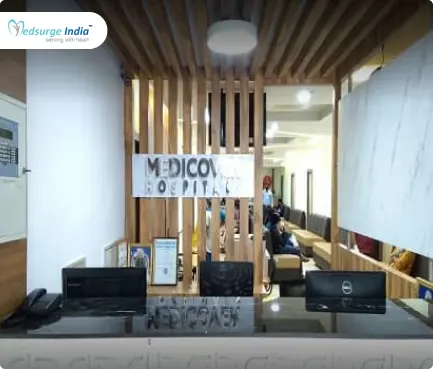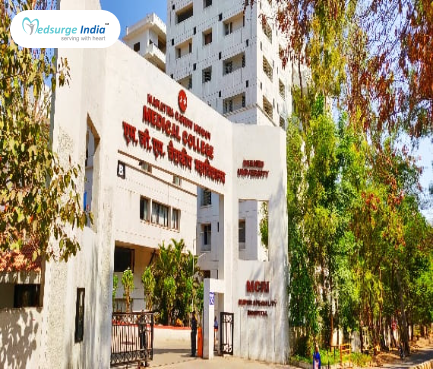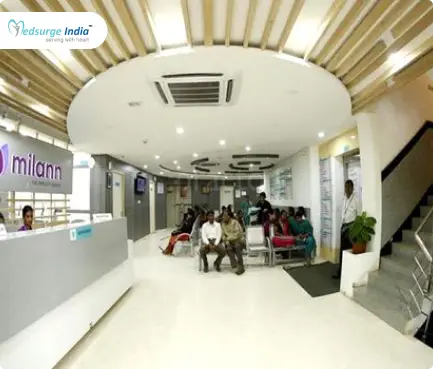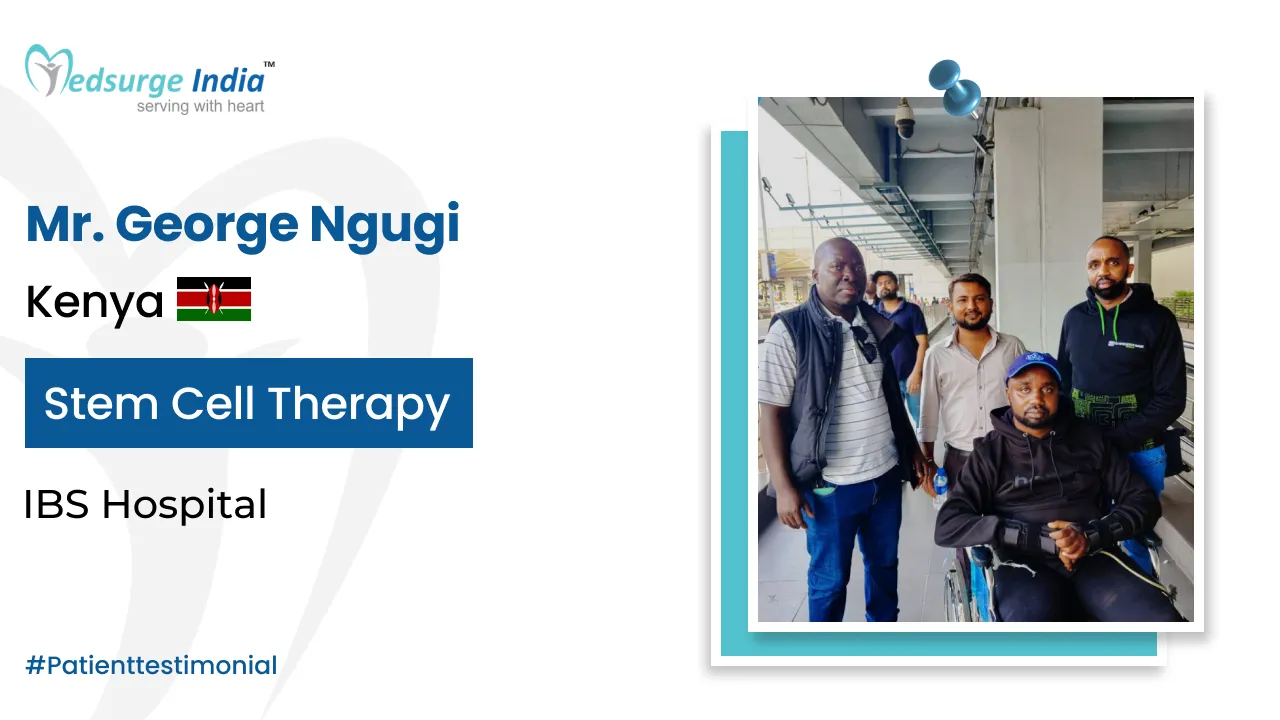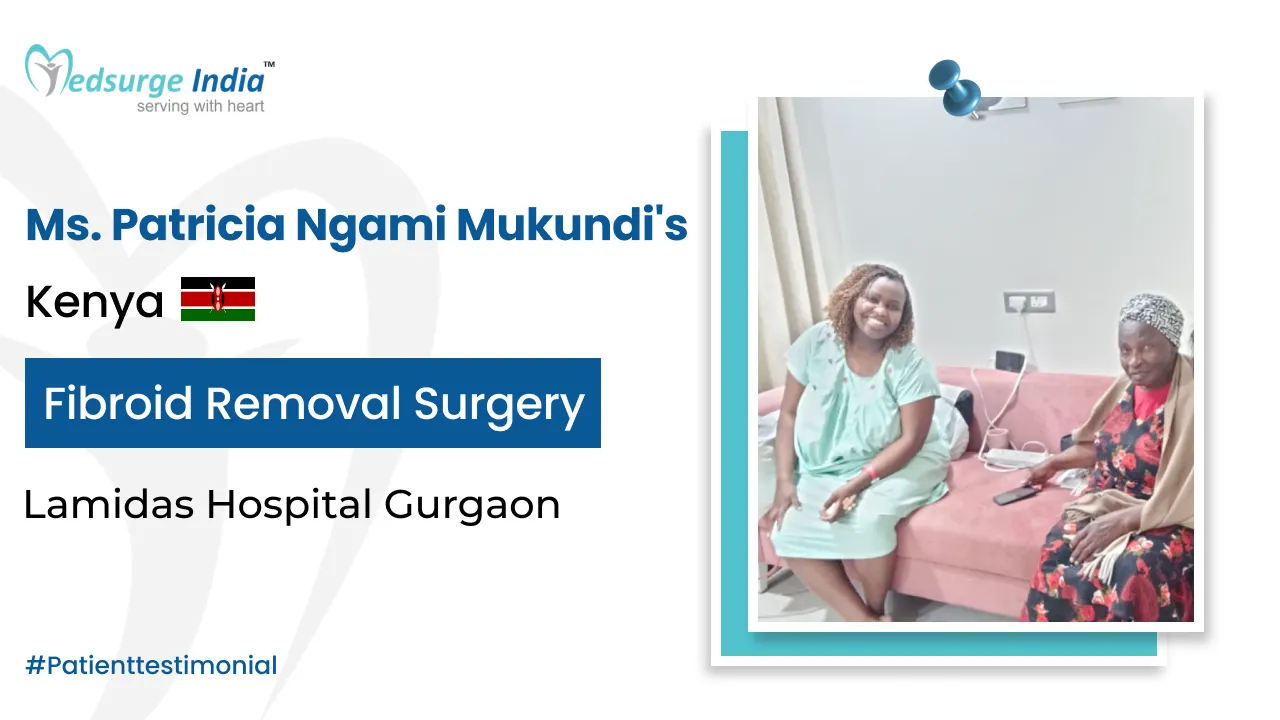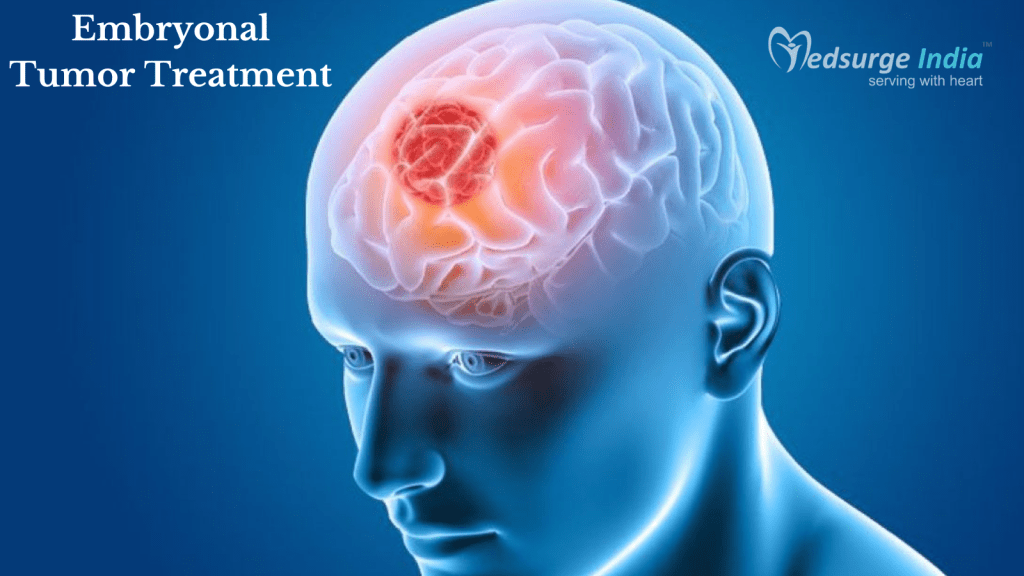
Embryonal brain tumors develop from cells found in the developing embryo and start in developing tissues and organ systems. They not only invade nervous tissue, but also the cerebrospinal fluid (CSF) and subarachnoid space. These tumors are common in children and are usually diagnosed before the age of five. Embryonal tumor treatment in India will be determined by the type, size, and location of the tumor. In most cases, treatment begins with surgery, and other tests can or may be performed depending on the condition of the tumor and the doctor’s preference.
Embryonal tumor treatment cost in India is less expensive than in other countries such as the United States and others. Hospitals in India provide you with the best specialists and surgeons, as well as excellent treatment quality that you will not find in other regions of the world.
What Is an Embryonal Tumor?
Embryonal tumors are cancerous (malignant) tumors that begin in the brain’s embryonic cells. This tumor can occur at any age, but it most commonly affects babies and young children. These tumors were previously known as “primitive neuro-ectodermal tumors”, but studies have revealed important differences that have resulted in the identification and renaming of new sub-types. This is a significant step forward because it allows clinicians to tailor existing treatments to each patient’s risk and researchers to look for new ways to combat these difficult tumors.
Types of Embryonal Tumors:
Medulloblastomas: These fast-growing cancerous brain tumors begin in the lower back part of the brain, called the cerebellum, and are the most common type of embryonal tumor. Muscle coordination, balance, and movement are all controlled by the cerebellum. Medulloblastomas typically spread to other areas of the brain and spinal cord via cerebrospinal fluid (CSF), but they rarely spread to other parts of the body.
Multilayered rosettes on embryonic tumors (ETMRs): ETMRs are rare cancerous tumors that typically occur in infants and young children. These aggressive tumors most often begin in the cerebrum, the largest part of the brain that controls thinking and voluntary movement. ETMRs can also occur in other parts of the brain and are frequently accompanied by a genetic change.
Medulloepitheliomas: These are rare, rapidly growing cancerous tumors typically develop in infants and young children’s brains or spinal cords.
Teratoid/rhabdoid tumors that are atypical: These are rare, cancerous tumors that are most commonly found in infants and children under the age of three.
Other types of embryonal tumors: Most cancerous tumors that were previously known as primitive neuroectodermal tumors (PNETs) that occur in the brain and spinal cord are now classified as embryonal tumors not otherwise specified.
What Are the Signs and Symptoms of Embryonal Tumors?
Symptoms and signs can vary depending on the type of brain tumor and its size, shape, location, and growth. Here are some signs and symptoms of embryonal tumors:
- Change in the pattern of headaches
- Headaches become more frequent and more severe
- Unexplained nausea or vomiting
- Vision problems, such as blurred vision, double vision, and loss of peripheral vision
- Slowly loss of sensation or movement in an arm or a leg
- Difficulty with balance
- Speech difficulties
- Feeling exhausted on a regular basis
- Confusion in daily routine activities
- Difficulty making decisions
- Inability to follow simple instructions
- Personality or behavior changes
- Seizures, in someone who doesn’t have a history of seizures
- Difficulty in hearing
What Are the Causes of Embryonal Brain Tumors?
The cause of an embryonal tumor is not always known. Certain inherited diseases, however, increase the risk of developing this type of tumor, and mutations in cell genes may result in the formation of these tumors. Childhood brain tumors are thought to be caused by radiation exposure. Pediatric Embryonal tumors can occur at any age, but they are most common in infants and young children. Turcot syndrome, Rubinstein-Taybi syndrome, Nevoid basal cell carcinoma (Gorlin) syndrome, Li-Fraumeni syndrome, and Fanconi anemia are all inherited diseases that increase the risk of developing this type of tumor.
Embryonal Tumor Treatment Cost in India
On average, Embryonal Tumor Treatment Cost in India starts from USD 2900. The cost of Embryonal Tumor treatment in India will also depend on various factors.
Estimated prices depending on different cities in India
| Cities | Starting Price |
| Delhi | USD 2900 |
| Gurgaon | USD 3000 |
| Noida | USD 3000 |
| Mumbai | USD 3100 |
| Hyderabad | USD 2900 |
| Chennai | USD 2900 |
| Kolkata | USD 2900 |
| Bangalore | USD 3200 |
Note: Do remember that the pricing and the treatment for Embryonal Tumor Treatment cost in India will vary depending on the patient’s choice and other various factors.
Factors That Can Affect Embryonal Tumor Treatment Cost in India
The following here are some variables that can affect Embryonal Tumor Treatment Cost in India:
- Medication costs.
- Duration of treatment.
- Geographical location.
- Hospitalization expenses.
- Government policies and subsidies.
- Medical tourism packages.
- Hospital reputation and infrastructure.
- The expertise and experience of medical professionals.
- The type and frequency of diagnostic procedures.
- The choice of treatment modality.
Furthermore, even the standard and grade of medical care and amenities are comparable to those of the most prestigious healthcare facilities in the world, even when the expense of lodging, meals, and transportation is taken out. Also, under the direction of the most skilled physicians, Medsurge India provides patients with the lowest Embryonal Tumor Treatment Cost in India.
How Embryonal Brain Tumor Diagnosis is Done?
For diagnosing embryonal tumors tests like imaging tests and other procedures will be recommended by your doctor. The following test is done for the diagnosis of embryonal brain tumors:
- A neurological exam: A neurological exam may also include testing your vision, hearing, balance, coordination, strength, and reflexes.
- Imaging tests: Magnetic resonance imaging (MRI) is primarily used to aid in the diagnosis of brain tumors, and a variety of MRI scan components, such as perfusion MRI and magnetic functional spectroscopy, aid in the evaluation of the tumor and pan treatment. Other tests, such as computed tomography (CT scan) and positron emission tomography (PET), are also used and recommended in certain situations.
- Sample collecting and testing of abnormal tissue (biopsy): A biopsy is a procedure that is used to remove a sample or tissue of cells from the body so that it can be tested.
Helpful – Brain Tumor Surgery Cost in India
Get Free Cost Estimation
Procedure
What Are the Possible Treatments Options for Embryonal Brain Tumor?
Treatment for any type of brain tumor is determined by the type, size, location, and overall health and preference of the patient.
The following options are used for embryonal brain tumor treatment in India:
- Surgery: Surgery is usually the first option for patients. A specialized neurosurgeon will remove the tumor as much as possible. A portion of the tumor can be removed to help alleviate your symptoms and signs. If not done correctly, there are risks such as bleeding, infections, and other factors.
- Chemotherapy: In chemotherapy, drugs are used to kill tumor cells. These help in reducing the risk of the tumor coming back or spreading to other parts of the brain.
- Radiotherapy: High-energy X-rays are used to destroy brain tumor cells. These aid in lowering the risk of tumor cells returning and spreading to other parts of the brain.
- Targeted drug therapy: As this treatment can cause cancer cells to die, these treatments focus on abnormalities present within cancer cells and block these abnormalities.
- Rehabilitation after treatment: Because brain tumor cells can form in areas of the brain that control your motor skills, speech, vision, and thinking, rehabilitation is required. Depending on your needs, your doctor may recommend physical therapy, speech therapy, occupational therapy, or other therapies.
The cost of embryonal treatment in India is determined by factors, including:
- the severity of the condition
- The location and accreditations of the hospital were chosen.
- Surgical experience
- Hospital stay duration
- Room type
- Additional procedures if required.
What Are the Risk Factors for Embryonal Tumor?
In most cases, the cause of the tumor isn’t clear and known, but doctors have identified some factors which may increase the risk of brain cancer. These include:
- Family history of brain tumor
- Exposure to harmful radiations.
Know that having a risk factor doesn’t mean that you will have the disease as many people get brain tumors without having any known risk factors.
Suggestion
Children with embryonal tumors should be seen at a center that has a team of pediatric specialists with expertise and experience in pediatric brain tumors, as well as access to the most up-to-date technology and treatments for children, to ensure proper diagnosis and treatment.
Following treatment, you will have regular appointments with your doctor or nurse. At each appointment, your doctor will examine you. They inquire as to how you are feeling, whether you have experienced any symptoms or side effects and whether you are concerned about anything. MRI scans are also performed on some visits. An MRI scan is usually performed every 6 months.
The Most Important Frequently Asked Questions
Q: Is Embryonal Carcinoma Aggressive?
A: It is present in about 40% of tumors and is among the most rapidly growing and is potentially aggressive tumor types.
Q: Is Embryonal Carcinoma Curable?
A: Currently, embryonal carcinoma patients have been treated with test cisplatin-based adjuvant chemotherapy with nearly complete success. Patients with recurrent or residual tumors are treated with a combination of chemotherapy.
Q: What Is the Survival Rate of Childhood Brain Cancer?
A: Survival rates for common brain and spinal cord tumors in children can come to about 25% for anaplastic astrocytoma, about 20% for Gliboblastoma, and about 75% for anaplastic Ependymoma.
Q: Is Embryonal Carcinoma Rare?
A: it is a rare type of non-seminomatous germ cell tumor that occurs in the mediastinum of young males.
Q: What Is ETMR Cancer?
A: Embryonal tumor with multilayered rosettes is known as a rare and aggressive embryonal central nervous system tumor. This occurs in young children.
Top Hospitals for Embryonal Tumor Treatment in India
Top Doctors for Neurology And Neurosurgery
Dr. Sudhir Dubey
Associate Director
Experience: 28 years of experience
Medanta – The Medicity, Gurgaon
Gurgaon, India
Dr. Vikas Gupte
Consultant
Experience: 24 years of experience
Fortis Hospital, Mulund, Mumbai
Mumbai, India
Dr. Vikas Naik
Consultant
Experience: 10 years of experience
Fortis Hospital, Bangalore (Bannerghatta Road)
Bangalore, India
Dr. Vinit Suri
Consultant
Experience: 38 years of experience
Indraprastha Apollo Hospital New Delhi
New Delhi, India
Dr. Dhanashri Chonkar
Consultant
Experience: 32 years of experience
Fortis Hospital, Mulund, Mumbai
Mumbai, India
Dr. Satish Satyanarayana
Senior Consultant
Experience: 32 years of experience
Fortis Hospital, Bangalore (Bannerghatta Road)
Bangalore, India
Dr. Zulkifli Misri
Experience: 29+ years of experience
KMC Hospital, Hampankatta, Mangaluru
Mangaluru, India
Dr. Vishal Peshattiwar
Head of Department
Experience: 22 years of experience
Kokilaben Dhirubhai Ambani Hospital Mumbai
Mumbai, India
Dr. T.K. Banerjee
Consultant
Experience: 28 years of experience
AMRI Hospital, Kolkata (Dhakuria)
Kolkata, India
Dr. Soumitra Roy
Consultant
Experience: 27 years of experience
Calcutta Medical Research Institute, Kolkata
Kolkata, India
Dr. Manvir Bhatia
Senior Consultant
Experience: 23 years of experience
Fortis Escorts Hospital New Delhi
New Delhi, India
Dr. Haseeb Hassan
Experience: 18+ years of experience
AMRI Hospital, Kolkata (Mukundapur)
Kolkata, India
Dr. Rekha Mittal
Senior Consultant
Experience: 31 years of experience
Madhukar Rainbow Children’s Hospital & BirthRight by Rainbow, New Delhi
New Delhi, India
Dr. Annu Aggarwal
Consultant
Experience: 15 years of experience
Kokilaben Dhirubhai Ambani Hospital Mumbai
Mumbai, India








